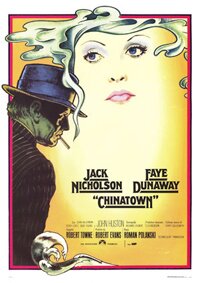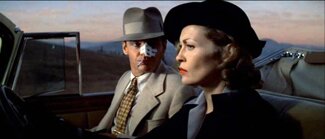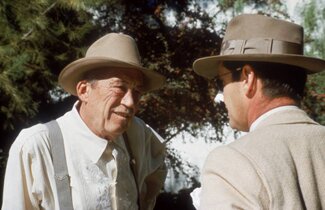I don’t thing many people would argue that Hondo is the best of John Wayne’s movies. Similarly, I don’t many will argue against it being among his best both as a western and as a performance from Wayne. But if ever there was a movie that illustrated what John Wayne did onscreen, how he came across and essentially provided a definition for those words “John Wayne,” it’s Hondo.
The great and debatable Red River
I really go on a ramble here about this movie, though it is more a ramble about John Wayne’s acting and speech pattern than the film. This is considered one of the great westerns by many and I would be among them. However, while I like Wayne in it and think it’s one of his best roles, it is not my favourite John Wayne performance.
Chinatown and the self-aware noir
It’s Day 5 of For the Love of Film (Noir) — don’t forget to or use the button on the right. And if you are interested in boatloads of great links to musings on film noir and its films, scroll down this page at Self-Styled Siren or over at Ferdy on Films. This is wonderful material! (Also see today’s Blogathon Notes.)
One of the few things I’m certain about with the movies that started this whole film noir business, movies from the forties and fifties like The Big Heat, Double Indemnity, or Gilda, is that they were not aware of themselves as being in a genre called film noir. They might have thought of themselves as B-movies, crime movies or pulp, but not film noir. Categorization like that always comes after the fact.
But once an approach or style is identified, like film noir, subsequent movies taking that approach are self-aware. They see themselves as film noir and inevitably try to replicate the approach. They may try to do much more, but they can’t be made the same way as the original film noirs were. Awareness affects what is being created.
Just as you can’t see the same movie twice (not in the same way), you can’t make the same kind of movie twice. But you can come damn close!
Chinatown (1974)
Directed by Roman Polanski
Chinatown, a wonderful movie, is an example of what a script can do for a film.
It’s like finding the right music at a party. Someone feels compelled to dance, then another and another. Soon, everyone’s up dancing. And dancing well.
In Chinatown, just about every artist is dancing their damnedest because the script has pulled them onto the floor. Director, actors, lighting people, costume designers … they’re all performing at their highest level.
It’s Robert Towne’s script that has done this.
One of Roman Polanski’s great talents is creating mood and few films do it so well and so quickly as the opening of Chinatown. I can’t think of many movies I would watch simply to see the opening credits but the look and the marvellous music of the introductory credit sequence is just so good with its period lettering and sepia tone (which carries through the movie), that you’re hooked even before the movie has presented its opening shot.
Modelling itself on the film noir style (particularly films like Howard Hawks’ movie The Big Sleep), the film’s mystery is created by presenting the story through the eyes of detective Jake Gittes, the Jack Nicholson character. We know what he knows, we’re puzzled by what he’s puzzled by, we’re misled by what misleads him. In fact, just as Bogart was in just about every scene of The Big Sleep, Nicholson is in just about every scene in Chinatown, either as a participant or as an observer.
But the film isn’t dependent on Nicholson. Faye Dunaway is perfectly cast as the enigmatic, and troubled, Evelyn Mulwray. It’s hard to imagine anyone else but Dunaway in that role. The movie is also bolstered by brilliant supporting performances, particularly John Huston as Noah Cross.
I also love the leisurely way the movie unfolds. Unlike the quick cuts and thrumming soundtrack of most current movies, Polanski takes his time. And it works so well. This may be the reason why it works. You’re seduced by the mood, and become involved with the characters, and thus the story.
Chinatown is a great, fascinating movie that illustrates the importance of beginning with a great script.
With the DVD … it’s okay. Not great, could be a lot better, but adequate. It’s largely clean and clear, but certainly not on the pristine level.
This is partly due to it being an older film (1974). For extras, there is really just one (I don’t count trailers as extras).
There is a documentary of sorts. It features interview clips with director Roman Polanski, writer Robert Towne, and producer Robert Evans.
There are some interesting comments, but there is really no depth to it … Par for the course with DVD extras.
(Note: This was written more than 10 years ago. The DVD comments refer to an early DVD release. The movie has since been released in a “special edition” which, I believe, is an improvement.)
20 Movies: His Girl Friday (1940)
I’ve always liked Howard Hawks and this movie, His Girl Friday, is one of my favourites from his long list of films. Apart from being a famously funny movie, it’s known for the incredibly rapid fire dialogue between Cary Grant and Rosalind Russell.
His Girl Friday (1940)
directed by Howard Hawks
It occurs to me that the best movies are one of two types. They are visually compelling, like the recent Hero, where there almost seems to be no need for dialogue. The images communicate almost everything.
Or, the movie relies heavily on great dialogue, the kind that is fun to hear and is engaging, and reveals everything about the characters.
A movie like 1995’s Get Shorty is a good example.
An older and better example, from 1940, is His Girl Friday, directed by Howard Hawks and starring Cary Grant and Rosalind Russell. It’s correctly considered a classic with its rapid fire dialogue and frenetic pace.
Based on the play The Front Page, director Hawks had his screenwriter Charles Lederer make some changes. The biggest change was to make one of the two main characters, Hildy Johnson, a woman (played by Russell) – the ex-wife of editor Walter Burns (Grant).
This created an added dimension to the dynamic of two newspaper people – one wanting to leave the business (Johnson) and the other trying to get her to stay.
It was no longer just a struggle between editor and reporter; it was a battle of the sexes, which Hawks loved putting on film.
Hildy is not only leaving the newspaper business; she’s engaged to be married the next day to her new beau, Bruce Baldwin (Ralph Bellamy), a rather dull insurance guy. He’s the complete opposite of Grant’s flamboyant (and not to be trusted) Walter.
And Walter is determined to get Hildy back – both as his wife and as his reporter. He determines to do this by appealing to the journalist in her. Through guile and deceit, he’s going to try to hook her like a fish and reel her in. Fortunately for him, there is an execution scheduled at the prison of convicted murderer Earl Williams (John Qualen) who, Walter casually mentions to Hildy, may be innocent.
Being based on a play, His Girl Friday only has about three sets and, with the exception of the opening which uses a moving camera, most shots are static, the scenes occurring in sets where characters enter and leave like a train station platform.
But given the simplicity of the sets and the static nature of the cameras, it’s really quite amazing how fast everything is and how much energy is generated.
What’s marvellous about watching the give and take between Grant and Russell, apart from the speed, the quick witted lines and great, comic takes (particularly by Grant) is how, as we see them battle, we also see how clearly they are suited for each other and meant to be together.
Ralph Bellamy’s Bruce never has a chance.
65 years later, His Girl Friday still stands up. It’s as fast and funny today as it was then.
And with the world of recent comedies, it’s something of a relief to see characters who are smart and a film that can make us laugh without dropping its pants.
(This review was written around 2002-2003.)
See: 20 Movies – The List
20 Movies: Chinatown (1974)
The problem with listing these 20 movies is that I’m building a list of movies I want to see again. But I guess that’s not such a bad thing.
With Chinatown, we get an enthralling mystery and one of the best examples of what a strong script will do for a movie.
 Chinatown (1974)
Chinatown (1974)
directed by Roman Polanski
Chinatown, a wonderful movie, is an example of what a script can do for a film.
It’s like finding the right music at a party. Someone feels compelled to dance, then another and another.
Soon, everyone’s up dancing. And dancing well.
In Chinatown, just about every artist is dancing their damnedest because the script has pulled them onto the floor. Director, actors, lighting people, costume designers … they’re all performing at their highest level.
It’s Robert Towne’s script that has done this.
One of Roman Polanski’s great talents is creating mood and few films do it so well and so quickly as the opening of Chinatown. I can’t think of many movies I would watch simply to see the opening credits but the look and the marvellous music of the introductory credit sequence is just so good with its period lettering and sepia tone (which carries through the movie), that you’re hooked even before the movie has presented its opening shot.
 Modelling itself on the film noir style (particularly films like Howard Hawks’ movie The Big Sleep), the film’s mystery is created by presenting the story through the eyes of detective Jake Gittes, the Jack Nicholson character. We know what he knows, we’re puzzled by what he’s puzzled by, we’re misled by what misleads him. In fact, just as Bogart was in just about every scene of The Big Sleep, Nicholson is in just about every scene in Chinatown, either as a participant or as an observer.
Modelling itself on the film noir style (particularly films like Howard Hawks’ movie The Big Sleep), the film’s mystery is created by presenting the story through the eyes of detective Jake Gittes, the Jack Nicholson character. We know what he knows, we’re puzzled by what he’s puzzled by, we’re misled by what misleads him. In fact, just as Bogart was in just about every scene of The Big Sleep, Nicholson is in just about every scene in Chinatown, either as a participant or as an observer.
 But the film isn’t dependent on Nicholson. Faye Dunaway is perfectly cast as the enigmatic, and troubled, Evelyn Mulwray. It’s hard to imagine anyone else but Dunaway in that role. The movie is also bolstered by brilliant supporting performances, particularly John Huston as Noah Cross.
But the film isn’t dependent on Nicholson. Faye Dunaway is perfectly cast as the enigmatic, and troubled, Evelyn Mulwray. It’s hard to imagine anyone else but Dunaway in that role. The movie is also bolstered by brilliant supporting performances, particularly John Huston as Noah Cross.
I also love the leisurely way the movie unfolds. Unlike the quick cuts and thrumming soundtrack of most current movies, Polanski takes his time. And it works so well. This may be the reason why it works. You’re seduced by the mood, and become involved with the characters, and thus the story.
Chinatown is a great, fascinating movie that illustrates the importance of beginning with a great script.
See: 20 Movies – The List
Chinatown (the trailer)
Leopards and actors and Cary Grant
I rewatched for the nth time (I’ve lost track) Howard Hawk’s Bringing Up Baby (1938). Apart from being great fun each time I watch it, this time was a bit different having read Marc Eliot’s book, Cary Grant: A Biography, and having previously watched Cary Grant: A Class Apart (a documentary on the second disc of the two-disc special edition DVD).
Here’s why this is interesting: Seeing Bringing Up Baby, at least as I do, you would think Cary Grant is in full command of what he’s doing — the ever skillful and brilliant, Cary. However, what you find out is that that is anything but the case.
Grant had had huge success with the previous year’s The Awful Truth (1937). However, he never took credit for its success because he had no idea how he had done it. He felt it was a fluke. He had been extremely anxious over his character, not sure how to play him, copying many mannerisms and stances of his then director, Leo McCarey.
Following closely on The Awful Truth, he was worried again about how to play his character in Bringing Up Baby and, compounding this, “… he was afraid to make a movie that was too stylistically similar in which his performance would not be as good.” (From Eliot’s biography of Cary Grant, p. 178.)
“Hawks then suggested to Grant that he look at some of the films of Harold Lloyd. Grant did and was so taken with the comedian’s style of acting that he actually copied it, almost gesture for gesture, in putting together his interpretation of David Huxley, down to the thick horn-rimmed glasses, one of Lloyd’s cinematic trademarks.” (Eliot’s biography of Cary Grant, p. 178.)
Still, while his template may have been Harold Lloyd what ends up on screen is pure Cary Grant, albeit with a Lloyd influence and the Cary Grant of a certain period of his career (younger, pre-Hitchcock etc.).
Of course, background isn’t necessary to enjoying this comedy classic. It may even get in the way until you’ve seen it a few times. It’s one of the great screwball comedies, peppered with absurdities and the better for it.
For what it’s worth, here’s the assessment I wrote a while back of Bring Up Baby (the two-disc special DVD edition).


